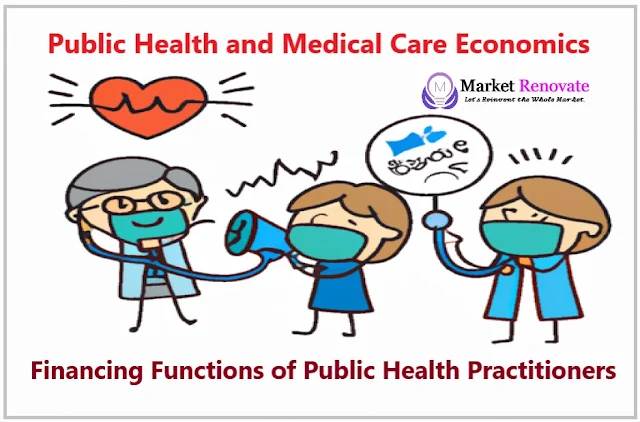Public Health and Medical Care Economics and Financing Functions of Public Health Practitioners and the Need for Studying the Course
Public health professionals play a crucial role in addressing the financial and economic aspects of public health and medical care. As professionals responsible for protecting and promoting population health, they are tasked with a variety of responsibilities involving resource allocation, policy development, and financial management. Let’s examine the highlights of public health and medical care economics and financing functions of public health practitioners, with an emphasis on the importance of taking this course.
Public health professionals play an indispensable role in promoting population health and optimizing medical care delivery. The study of public health economics and financing equips students with the knowledge and skills necessary to address complex economic and financial challenges in the public health domain.
By understanding resource allocation, cost-effectiveness, and the implications of health policy, public health practitioners can contribute to the development of sustainable and equitable healthcare systems that benefit communities and enhance well-being as a whole. As a result, the study of public health economics and financing is of the utmost importance for health professionals, as it equips them to influence positive changes in the fields of public health and medical care.
I. Public Health Economics and Financing Functions of Public Health Practitioners:
- Resource Allocation and Budgeting: Public health practitioners are central to the efficient allocation of resources within public health programs and initiatives. They utilize economic principles to determine the optimal distribution of funds, ensuring that interventions with the highest impact on population health receive adequate support.
- Cost-Benefit Analysis and Economic Evaluations: Public health practitioners conduct cost-benefit analyses and economic evaluations to assess the value of various health interventions and policies. This aids in determining the cost-effectiveness of public health programs and enables evidence-based decision-making.
- Health Policy Development and Evaluation: Public health practitioners contribute to the formulation and evaluation of health policies, taking into account the economic implications. Their expertise ensures that policies align with the financial capacity of healthcare systems while addressing public health needs.
- Healthcare Financing and Insurance Strategies: Public health practitioners are instrumental in designing and implementing healthcare financing and insurance mechanisms. They analyze funding models and assess the financial sustainability of healthcare systems to promote equitable access to medical care.
- Advocacy for Health Equity: Public health practitioners advocate for health equity by addressing the social determinants of health and promoting policies that reduce health disparities. They emphasize the economic benefits of equitable health interventions, which contribute to a healthier and more productive society.
- Public Health Program Planning and Management: Public health practitioners engage in planning and managing public health programs with an economic lens. They consider resource constraints and ensure the efficient utilization of funds to achieve program objectives.
II. Medical Care Economics and Financing Functions of Public Health Practitioners:
- Healthcare Service Cost Analysis: Public health practitioners analyze the costs of healthcare services to understand their financial implications. They assess the expenses associated with medical treatments, tests, and procedures, which informs decision-making regarding resource allocation and reimbursement strategies.
- Healthcare Delivery System Efficiency: Public health practitioners work to improve the efficiency of healthcare delivery systems. They identify areas where resources may be underutilized or where inefficiencies exist, and recommend interventions to optimize service delivery, thereby reducing healthcare costs while maintaining or improving health outcomes.
- Patient Financial Management: Public health practitioners support patients in managing their healthcare expenses by providing information on available financial resources, insurance options, and cost-effective treatments. They aim to reduce financial barriers to accessing medical care.
- Healthcare Payment Models: Public health practitioners explore and design healthcare payment models that incentivize value-based care and cost containment. They contribute to the development of payment systems that reward quality outcomes rather than volume of services.
- Healthcare Revenue Generation: Public health practitioners may be involved in exploring revenue generation opportunities for healthcare institutions and public health agencies. They assess strategies to diversify funding sources and support the financial sustainability of healthcare organizations.
III. The Need for Studying Public Health Economics and Financing:
- Enhanced Decision-Making Skills: health students studying public health economics and financing gain valuable decision-making skills that are essential for managing resources effectively and making evidence-based policy choices. These skills are critical for addressing complex public health challenges.
- Understanding Resource Constraints: Public health systems often operate under resource constraints. By studying public health economics and financing, health students gain insights into managing limited resources efficiently to achieve the best possible health outcomes.
- Promoting Health Equity: Public health economics helps health students understand the socioeconomic determinants of health disparities and the economic implications of health inequities. Armed with this knowledge, they can advocate for policies that reduce health disparities and promote health equity.
- Optimizing Public Health Interventions: The study of public health economics equips health students with tools to assess the cost-effectiveness of public health interventions. This enables them to identify interventions with the greatest impact on population health and allocate resources accordingly.
- Navigating Healthcare Systems: As public health practitioners, health students need to navigate complex healthcare systems. Knowledge of medical care economics and financing enables them to understand healthcare delivery models, payment systems, and insurance options.
- Addressing Healthcare Access Challenges: health students studying public health economics and financing are better equipped to address healthcare access challenges, especially for vulnerable populations. They can design and advocate for policies that enhance healthcare affordability and availability.
- Contributing to Policy Development: Public health economics and financing play a significant role in shaping health policies. health students with a strong foundation in this area can actively contribute to the development and evaluation of health policies that promote population health and fiscal sustainability.






Please leave your comments or ask your queries here. The comments shall be published only after the Admin approval.